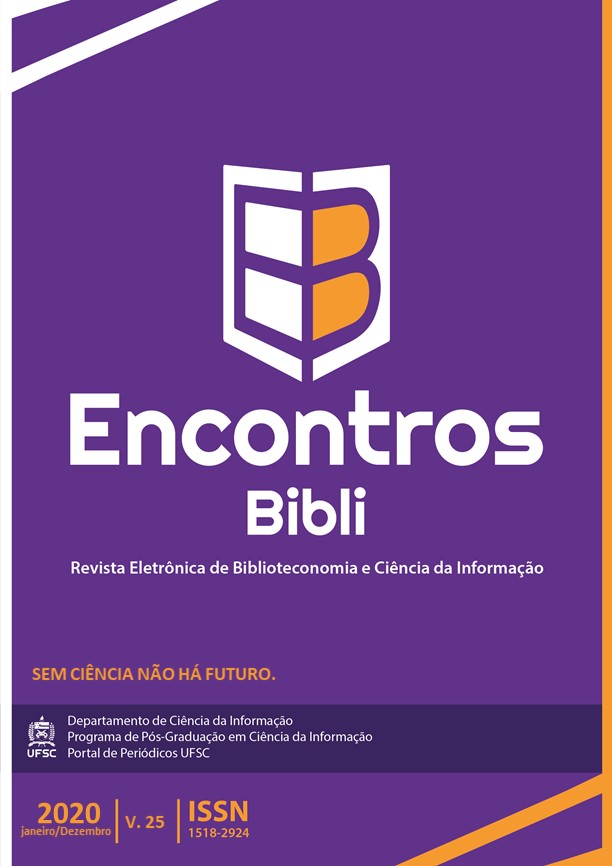The post-truth phenomenon and its implications for the information science research agenda
DOI:
https://doi.org/10.5007/1518-2924.2020.e72673Keywords:
Post-truth, Epistemology of information science, Fake newsAbstract
Objective: We present the characteristics of the phenomenon known as post-truth and how it is placed on the information science research agenda.
Methods:An updated literature review is made about the phenomenon of post-truth and its tension with the literature on epistemology of information science, considering authors and perspectives from different countries.
Results: It is evident that the phenomenon of post-truth implies considerable changes in the way information is produced, shared, consumed and used, presenting dimensions previously unheard of in informational issues. The intellectual production of information science, which for decades has privileged certain dimensions of informational phenomena (relevance, retrieval, search strategies, dynamics of identity and memory) has not yet developed adequate categories of analysis to have a centrality in the dimension of “truth” of the information.
Conclusions: It is recommended that information science take advantage of the existing categories of analysis and theoretical models, combined with new interpretive schemes to be created, to diagnose, characterize and propose forms of resistance and action to the negative consequences of the post-truth phenomenon
Downloads
References
APARICI, R.; GARCÍA-MARÍN, M. (Coords). La posverdad: una cartografia de los médios, las redes y la política. Barcelona: Gedisa, 2019.
BAWDEN, D.; ROBINSON, L. Introduction to information science. Londres: Facet, 2012.
BLATT, R. Historia reciente de la verdad. Madrid: Turner, 2018.
BRONCANO, F. Puntos ciegos: ignorancia pública y conocimiento privado. Madrid: Lengua de Trapo, 2019.
CASARA, R. A era pós-democrática. Porto: Exclamação, 2019.
COLL-VINENT, R. Ciencia documental: princípios y sistemas. Barcelona: Mitre, 1984.
CRONIN, B. The sociological turn in information science. Journal of Information Science, v. 34, n. 4, 2008, p. 465-475.
DAVIS, C.; SHAW, D. Introduction to information science and technology. Medford: Information Today, 2001.
DEBONS, A.; HORNE, E.; CRONENWETH, S. Information science: an integrated view. Boston: G. K. Hall, 1988.
EATWELL, R.; GOODWIN, M. Nacionalpopulismo: por qué está triunfando y de qué forma es un reto para la democracia. Barcelona: Península, 2019.
ESTEVE, A. Prólogo. El triángulo: política, economía y periodismo. In: ALAPONT, M. P. La comunicación en la era Trump. Barcelona: UOC, 2017, p. 15-18.
FUKUYAMA, F. Identidad: la demanda de dignidad y las políticas de resentimiento. Barcelona: Deusto, 2019.
GARCÍA-MARÍN, D.; APARICI, R. Estrategias de la posverdad y política cyborg. In: APARICI, R.; GARCÍA-MARÍN, M. (Coords). La posverdad: una cartografia de los médios, las redes y la política. Barcelona: Gedisa, 2019, p. 115-130.
GILCHRIST, A. (Ed.). Information science in transition. Londres: Facet, 2009.
GÓMEZ DE ÁGREDA, Á. Mundo Orwell: manual de supervivencia para un mundo hiperconectado. Madrid: Ariel, 2019.
HJORLAND, B. Library and information science (LIS), Part I. Knowledge Organization, v. 45, n. 3, 2018a, p. 232-254.
HJORLAND, B. Library and information science (LIS), Part 2. Knowledge Organization, v. 45, n. 4, 2018b, p. 319-338.
KAKUTANI, M. La muerte de la verdad: notas sobre la falsedad en la era Trump. Barcelona: Galáxia Gutemberg, 2019.
LINARES COLUMBIÉ, R. Ciencia de la información: su história y epistemología. Santa Fé: Rojas Eberhard, 2005.
McINTYRE, L. Posverdad. Madrid: Cátedra, 2018.
MUROLO, L. La posverdad es mentira. Un aporte conceptual sobre fake news y periodismo. In: APARICI, R.; GARCÍA-MARÍN, M. (Coords). La posverdad: una cartografia de los médios, las redes y la política. Barcelona: Gedisa, 2019, p. 65-80.
NOBLE, S. U. Algorithms of oppression: how search engines reinforce racism. Nova Iorque: New York University Press, 2018.
SANTAELLA, L. A pós-verdade é verdadeira ou falsa? Barueri: Estação das Letras e Cores, 2019.
SERRANO OCEJA, J. F. La sociedad del desconocimiento: comunicación posmoderna y transformación cultural. Madrid: Encuentro, 2019.
WILBER, K. Trump y la posverdad. Barcelona: Kairós, 2018.
Downloads
Published
How to Cite
Issue
Section
License
Copyright (c) 2020 Carlos Alberto Ávila Araújo

This work is licensed under a Creative Commons Attribution 4.0 International License.
The author must guarantee that:
- there is full consensus among all the coauthors in approving the final version of the document and its submission for publication.
- the work is original, and when the work and/or words from other people were used, they were properly acknowledged.
Plagiarism in all of its forms constitutes an unethical publication behavior and is unacceptable. Encontros Bibli has the right to use software or any other method of plagiarism detection.
All manuscripts submitted to Encontros Bibli go through plagiarism and self-plagiarism identification. Plagiarism identified during the evaluation process will result in the filing of the submission. In case plagiarism is identified in a manuscript published in the journal, the Editor-in-Chief will conduct a preliminary investigation and, if necessary, will make a retraction.
This journal, following the recommendations of the Open Source movement, provides full open access to its content. By doing this, the authors keep all of their rights allowing Encontros Bibli to publish and make its articles available to the whole community.
Encontros Bibli content is licensed under a Creative Commons Attribution 4.0 International License.
Any user has the right to:
- Share - copy, download, print or redistribute the material in any medium or format.
- Adapt - remix, transform and build upon the material for any purpose, even commercially.
According to the following terms:
- Attribution - You must give appropriate credit, provide a link to the license, and indicate if changes were made. You may do so in any reasonable manner, but not in any way that suggests the licensor endorses you or your use.
- No additional restrictions - You may not apply legal terms or technological measures that legally restrict others from doing anything that the license permits.

























